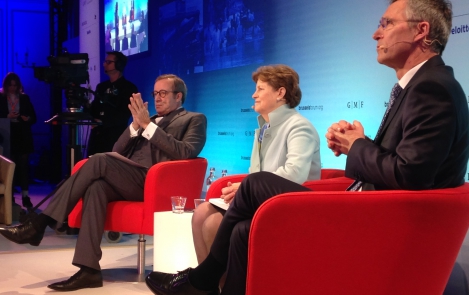-
Reset
+


President Ilves at the opening panel of Brussels Forum: the migration crisis will influence the political landscape of Europe
18.03.2016
Living in the bubble of peace dividends is over; the era of peace and understanding each other is over, stated President Toomas Hendrik Ilves at the opening panel of the Brussels Forum – a high-level foreign and security policy conference – which this year focused on the theme "A Grave New World: Future Global Security Challenges."
Aggression in Europe still weakens the security environment of Europe, stated the Estonian Head of State, recalling that two years ago today so-called elections were staged in one part of Ukraine, Crimea, and 98% of the population voted for a merger with Russia. Ukraine lost a part of its territory and is still at war with the aggressor in its eastern regions.
To answer the question regarding the European Union's common position with respect to extending sanctions against Russia, which will be discussed in July, President Ilves stated that Europe seems to be uniform on this matter, as there have been no breakthroughs to date on the implementation of the Minsk Agreements.
However, the Estonian Head of State described the current migration crisis as the biggest problem faced by European citizens, stating that those who only focus on the southern areas of the Europe are in error; just recently we witnessed troublesome developments as refugees entered Norway and Finland from the east.
As for the migration crisis, President Ilves invited us to take notice of the political dimension of the problem, as the crisis will influence the political landscape of Europe: the soil is now fertile for right-wing extremist forces to emerge and even take power.
He also mentioned the Eastern Partnership policy of the European Union, stating that we are unfortunately witnessing weak capacity for reforms in the Eastern Partnership, which is not comparable to the past decisiveness of the countries that restored their independence in the 1990s and have now become integrated with Europe.
The discussions of the 11th Brussels Forum will focus on changes in the trans-Atlantic security architecture, including the consequences of the credit crunch, climate and energy policies. Apart from the refugee crisis, which has a considerable external and internal influence on the European Union, the schedule includes debates on the future of Ukraine, developments in Russia and within its immediate environs, and the general impacts of the war in Syria and possible solutions to these problems. A separate focus will be on the impact of new technologies on society, incl. business, relations between citizens and the state and legislative drafting.
Office of the President
Public Relations Department




